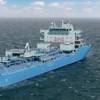Following a recent tragic accident in which a cargo inspector died from inhalation of a fumigant in a bulk carrier’s hold, the London P&I Club has warned its members of the particular need to control and supervise the movement of all onboard visitors when fumigation has taken place.
In the latest issue of its StopLoss Bulletin, the Club cites an incident in which a cargo of Argentinean grain underwent surface fumigation on a voyage to the Middle East. On completion of loading, aluminium phosphide tablets had been laid on the surface of the grain in each hold. On passage, the tablets decomposed, giving off the fumigant phosphine, which is heavier than air. Appropriate warning signs were posted around the hold access points, the deck officers had been properly trained to monitor the in-transit fumigation, and the ship carried the appropriate gas detection and respiratory protection equipment.
At the discharge port, the receivers’ cargo inspector was given permission to take cargo samples. The chief officer assumed that the inspector proposed taking a sample from a platform on the hatch coamings, but the inspector, who was very experienced and who seems to have assumed that the fumigant would have fully dispersed during the long sea passage, entered the hold via an access hatch which had been opened to assist ventilation, and was subsequently found dead in the aftermost hold.
The Club notes, “The owners have since changed their procedures so that hold accesses are only unsealed immediately prior to the space being checked that it is gas-free towards the end of discharge. And they have used this case to illustrate the importance of strictly controlling the movements of all visitors on board, no matter how experienced they might seem to be.”
Sponsored Content
Innovative Hull Maintenance: Profitable & Green

Subscribe for
Maritime Reporter E-News
Maritime Reporter E-News is the maritime industry's largest circulation and most authoritative ENews Service, delivered to your Email five times per week













